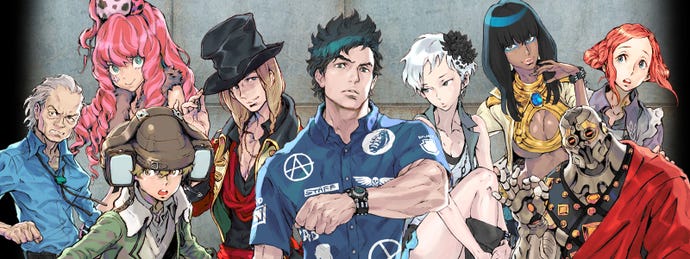JPgamer: Another Number Nine
This week on JPgamer, Pete gives some first impressions on 999's follow-up, the 3DS- and Vita-based visual novel-cum-adventure game Zero Escape: Virtue's Last Reward.
This article first appeared on USgamer, a partner publication of VG247. Some content, such as this article, has been migrated to VG247 for posterity after USgamer's closure - but it has not been edited or further vetted by the VG247 team.
You may recall that a few weeks ago I enthused extensively about Spike Chunsoft's Nintendo DS visual novel Nine Hours, Nine Persons, Nine Doors. Well, since beating that game I've been delving into the Vita version of the sequel Virtue's Last Reward, and I've been very impressed so far.
I'm yet to finish the game, so this post will be spoiler-free in nature -- and I'd ask that you keep any comments as spoiler-free as possible, too, please! -- but I've already come across a variety of interesting things that are worthy of some discussion.
Like its predecessor, Virtue's Last Reward is primarily a multi-path visual novel that occasionally interrupts all the reading with a room escape sequence, during which you must make use of your brain and any objects you happen to find lying around in order to make your way through a locked door. These escape sequences frequently make use of a combination of different puzzle types, ranging from adventure game-style "combine two objects then use them on something else" object manipulation to more in-depth minigames that unfold on a separate screen.
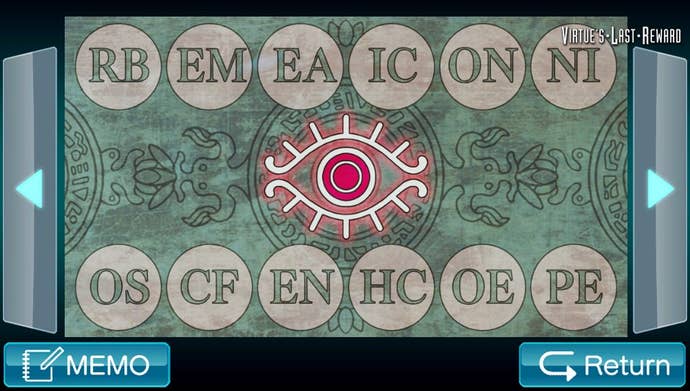
By far the most satisfying puzzles are those that don't hold your hand at all -- puzzles in which you know you have all the information on hand to be able to solve them, just not necessarily the knowledge as to how you can apply that information successfully. These range from making logical deductions about subtle visual clues you can see right in front of your face, to cracking secret codes hidden within the various documents you accumulate in the game's "file" screens. For those who do find themselves struggling a bit, an optional Easy mode prompts the other characters that you're paired up with -- the game's premise ensures that you're never alone -- to offer their own thoughts and suggestions on how you might go about solving them.
Things continue to get interesting, though, when you realize that every room has two solutions to its major puzzle, one of which reveals a code combination to escape the room and the other of which reveals some supplementary documents you can add to your files for additional information on the setting, characters and real-world concepts that are explored in the narrative. This latter part is entirely optional, but once you find one it's hard to resist the allure of this additional content in subsequent rooms. Cue much teeth-gnashing and head-scratching as you struggle to determine exactly how you could have possibly solved the puzzle you just completed in a slightly different -- but still correct -- way.
Things get really interesting with regard to the overarching, branching plot, however. A comprehensive tree diagram depicts your progress through the story and the decisions you made along the way, and at any point it's possible to stop what you're doing, jump back to somewhere you've already been and try something different.
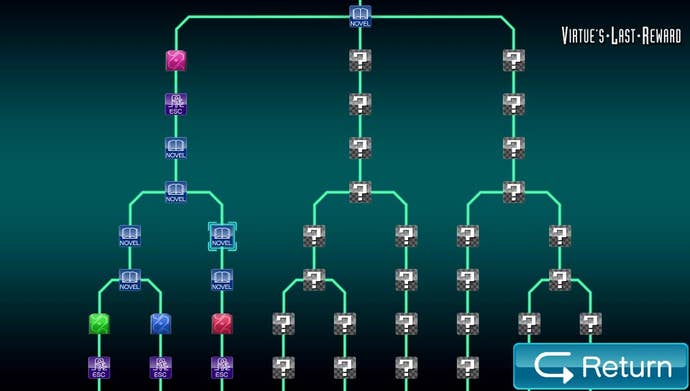
This may sound a bit like cheating the consequences of your decisions -- the equivalent of reloading a save after trying one option in a BioWare game to see which is "best" -- and perhaps it would be had the entire game not been designed around exploring this concept. On numerous occasions, you'll be confronted with a situation that seems inescapable; assuming you're not on a "bad ending" path, the story will end prematurely with a "To Be Continued..." message, and its node on the story map replaced by a lock. You'll then need to explore alternative story paths in order to uncover the information needed to escape these tricky situations and unlock the real ending for that particular path.
This is a narrative technique that the original 999 touched on -- in order to get the "true" ending in that game, it was necessary to see one specific ending first, then carry the "memories" of that ending through into a subsequent playthrough and use the information accordingly. Amazingly, 999 actually managed to justify this gameplay mechanic pretty convincingly in narrative terms, and although I haven't played enough of Virtue's Last Reward to say for sure as yet, it certainly seems that there's something similar at play here. Most intriguing, for sure.
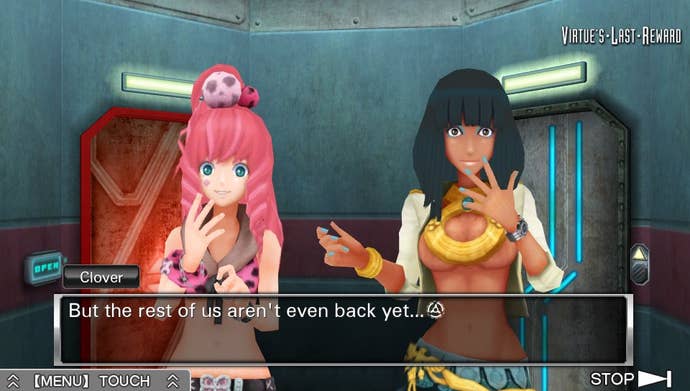
999 was a game built around the interactions and conflicts between its characters, and Virtue's Last Reward continues that proud tradition. In fact, it makes even more of it; whereas Zero's twisted "Nonary Game" in 999 was built around cooperation and, occasionally, enforced sacrifice, the "Nonary Game Ambidex Edition" seen in Virtue's Last Reward is specifically designed to put the characters at each other's throats; with regular opportunities to betray and potentially kill one another, it's very difficult to stay on the honorable path, and indeed a number of the game's endings explore the fact that sometimes, in order to save yourself, it becomes all but necessary to screw other people over.
The characters themselves are all interesting in their own right, too. Most are clad in a veil of mystery for the majority of the game, but proceeding down various narrative paths equips you with the information you need to get a full picture of who they are and what they're up to. They're not above lying, cheating and backstabbing you, either; it's both unusual and refreshing to find yourself questioning the motivations and honor of the entire main cast at one point or another -- particularly since there's no obvious "villain" to unite against, save for the possibility that one person among the group might be Zero.
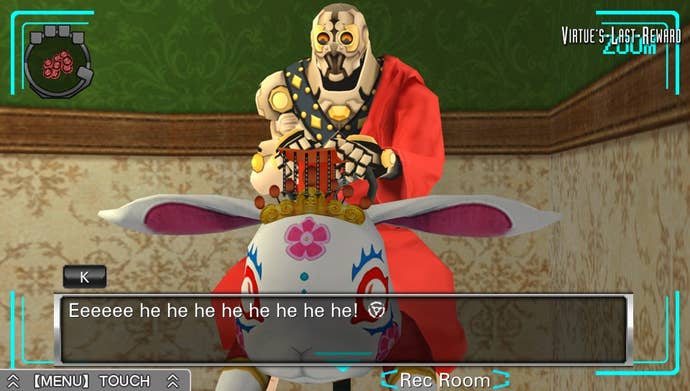
Virtue's Last Reward is a fine example of the creativity that's still coming out of Japan, though as Jeremy and I discussed in our recent 2013 in Review piece, director Kotaro Uchikoshi doesn't see himself working on similar games in the near future, due to Chunsoft not seeing them as "sustainable." And for sure Virtue's Last Reward is a niche interest work, consisting largely of non-interactive text, minimal animation and relatively little in the way of "gameplay" in the traditional sense -- but as I've argued in these very pages before, and as a large number of independent developers are continuing to discover, deliberately eschewing the popular perception of what a game "should" be can, more often than not, result in an incredibly compelling, memorable piece of interactive entertainment.
Such is the case with Virtue's Last Reward. I can't wait to see how the story continues, and I hope beyond hope that Uchikoshi continues to have the opportunity to do what he does best in the future.
